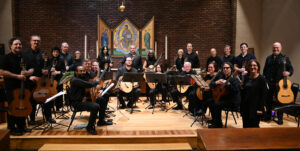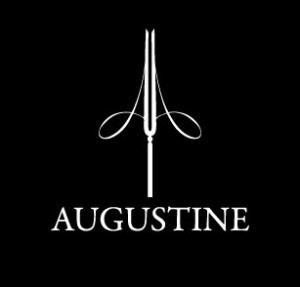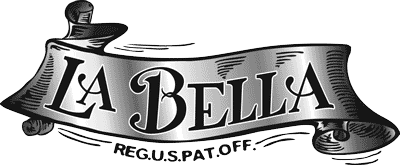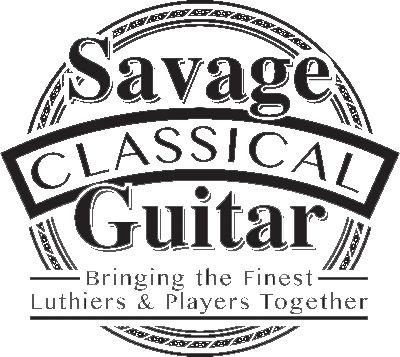by J. Andrew Dickenson
June 2006
If it seems like David Leisner is busy, well, he is. A performer, composer, recording artist, teacher and researcher, David never seems to be without a new project — or two or three or four — on the table. In the coming months, David will offer recordings of two concertos, publish a score for flute and guitar, and release a CD that showcases his entire body of solo guitar compositions. Busy, indeed. And we haven’t even mentioned his obsession with an obscure 19th century guitarist!
Your new CD, Self-Portrait, sounds exciting — why did you feel this was the right time to record your complete solo works?
I’ve written quite a lot of music over the years, many, many hours’ worth, and only a small amount of it has been recorded so far. I feel it is time to get more recordings out there. Most of my compositions are chamber music for guitar with voice or with other instruments, as well as a lot of works without the guitar, but for a whole album of my music, the most economical to record is solo guitar. My solo compositions come to just about an hour’s worth, perfect for a CD. So that’s how Self-Portrait was born.
In your compositions, you seem to take inspiration from many different places — sometimes there is a literary reference, others are inspired by your life, and you even quote traditional Jewish songs. What about these ideas inspire you?
First, all composition is inspired by the composer’s life, sometimes directly and sometimes not. That said, I also frequently get inspiration from visual art, write a lot of vocal music and so am affected deeply by poetry, and occasionally am sparked by a literary work for an instrumental piece. While looking at a work of visual art — a painting, lithograph, drawing, sculpture — I sometimes hear music without intending to, or sometimes have the feeling that what I’m seeing suggests a dramatic or emotional framework for a piece of music. Maybe it’s the interplay of shapes, colors and textures that suggest musical relationships, or maybe the undefinable, non-verbal mysteries that cannot quite be grasped rationally that yearn for musical transformation or many other possibilities. This happens naturally and so the conversion from visual input to musical creation is usually a smooth process for me. Is there a link between the stimuli of visual art, poetry and literature for me? I believe it’s only that I’m naturally curious and profoundly passionate about all the arts, and they often provide my creative nourishment.
Can you describe what it feels like when inspiration hits?
Usually the seed of a composition is contained in a single, unexpected, unconscious moment. As far as I can tell, there is no feeling attached to this moment, and barely even a sense of recognition. Most of the rest of the process is the patient unraveling and discovery of all that was contained in the seed.
How do you express things that are written — such as books or poems — with music?
For me, it is almost never a literal “soundtrack” or programmatic music approach. Usually it is a matter of a musical evocation of feelings. Describing it is elusive.
Do you have a favorite “child” of yours, or one that you feel is particularly personal?
Unquestionably, I have my favorites, so I guess I’m a bad “parent!” I can’t single out one (well, maybe not such a bad parent, after all), but a few. They are mostly pieces which are yet unpublished and that few people have heard so far. Confiding, originally for high voice and guitar and later arranged for voice and piano, is a half-hour song cycle to poems by women, mostly Emily Dickinson and Emily Bronte. It is emotionally very powerful, and I do not believe there is anything like it in the guitar repertoire. I wrote it twenty years ago. A more recent piece, Vision of Orpheus for guitar and string quartet is a five-movement work, inspired by a contemporary painting by Mark Spencer, and I like it for its use of the instruments and its darkness. Acrobats for flute and guitar takes its cue from a short story by Nathan Englander about the Holocaust. I am proud of its coherence and its portrayal of precariousness. I am also proud of Simple Songs for medium voice and guitar, with poems by Emily Dickinson, for its concision. And my guitar sonata, Nel Mezzo, is an ambitious and very dramatic work, drama being something quite difficult to achieve on the intimate guitar.
You have a few concerto performances coming out on CD as well.
I’m especially excited about the Hovhaness Concerto for guitar and orchestra, which I recorded last year in Berlin with the Berlin Radio Orchestra and Gerard Schwarz conducting. This is a half-hour masterpiece that had only one performance a couple of decades ago and was forgotten until I pressed Hovhaness’s widow to let me see the score. She liked very much my Telarc recording of her late husband’s big sonata for guitar and harp, Spirit of Trees, and she let me have a look. As soon as I looked through it, I told her with excitement that I thought it was a great piece and very significant in the small guitar concerto repertoire. She decided to include it on an all-Hovhaness recording, which will be released on the Naxos label by the end of the year.
The other concerto recording I made a few months ago in Poland with the Polish National Radio Orchestra. It is another half-hour piece, this time for guitar, percussion and strings, called The Heroic Triad. The composer is Andrew Thomas, who heads the Prep Division at Juilliard and is a very fine and underrated composer in his early 60s. With the composer conducting and the superb young Simon Boyar as solo percussionist, our recording of this engaging and beautifully constructed work will be released on the Opus One label.
What are some of the challenges of working with conductors and orchestras?
When you’re rehearsing and recording, especially, time is money, big-time, so the pressure’s on. You’ve got to be accurate, musical, exciting right away, without much time to warm up or without much leeway for experimentation. So, even more than a solo or chamber music experience, you have to have the music down cold!
Also, every conductor and orchestra is different, so the people skills and musical sensitivity required is different every time. This means you have to have a good deal of flexibility in order to roll with the punches.
An interesting little subtlety was demonstrated in the Berlin recording of the Hovhaness. In the U.S. and in most countries, when the conductor gives a downbeat, the orchestra plays exactly on time with that beat. But many European orchestral musicians, particularly the Germans, are used to playing slightly after the downbeat of the conductor, on purpose. It’s the kind of thing that could drive an American conductor mad! But the American Gerard Schwarz has had considerable experience conducting both in the U.S. and abroad. When there was a passage in the Hovhaness that proved particularly difficult to coordinate with the orchestra and me, he conducted the orchestra with one hand the German way and me with the other hand the American way. It was an unbelievably virtuosic moment!
Does a concerto experience change your playing?
Well, I would say that playing concertos tends to bring out the bolder, more exaggeratedly communicative elements of your playing, and this is likely to be transferred to your solo playing.
Tell me about your upcoming publications.
Doberman Editions, which just put out my Freedom Fantasies for solo guitar, is soon to publish Acrobats for flute and guitar.
What else is on the horizon for you?
I am really excited about the Cavatina Duo, Denis Azabagic and his flutist wife, Eugenia Moliner, recording my complete flute and guitar works for the Cedille label. They are recording all my flute and guitar duos and two trios, one with clarinet and the other with cello. They start next week. I can’t tell you happy it makes a composer to have such a phenomenally gifted duo be so committed to one’s music. They have been playing my piece, Acrobats, in every program of theirs for three years and apparently are still continuing to play it! They play it and the other pieces on the CD that I’ve heard with a mastery and sensitivity that is simply astounding.
Also, I’ve been performing and researching like crazy the works of Wenzeslaus Matiegka (1773–1830). This little-known composer and contemporary of Beethoven is, in my strong opinion, deserving of a major revival. In fact, I believe that he and Johann Kaspar Mertz are the two greatest guitar composers of the 19th century. The level of imagination, musical invention, harmonic surprise and contrapuntal complexity in Matiegka’s music is remarkable in the guitar literature of that era. I will play an entire evening of his music in late September at the Manhattan School of Music, as part of a mini-festival we are organizing among the faculty members, and then plan to record this repertoire in October for my next solo album for Azica.
Thanks so much for your time, David.
Many thanks for including me in this!









